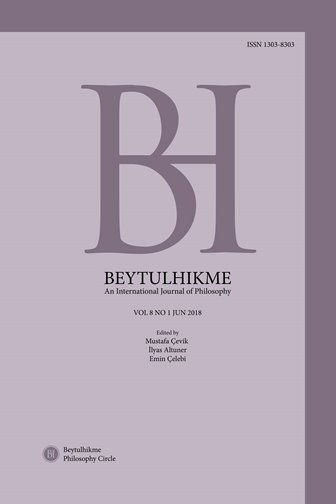Author :
Abstract
İnsanın iradesini kullanarak kendi canına kastetmesi olarak tanımlanan intihar, sosyolojik bir vakıa olmanın ötesinde, felsefi alanda insanın varoluşsal anlam arayışının bir karşılığı olarak derin tartışmaların konusu olmuştur. Bu çerçevede, intihar, antik dönemlerden günümüze felsefi alanda tartışılagelmiş: bu olguya yönelik farklı yaklaşımlar sergilenmiştir. Grek felsefesi, intihara genel olarak karşı çıkarken, Roma felsefesinde özellikle Stoacılıkta intihara yönelik felsefi düzeyde olumlu yaklaşımlar sergilenmiştir. Ömrünün son zamanlarını Roma’da geçiren Neoplatonizmin kurucu filozofu Plotinos da konuya ilgi duymuş, küçük boyutta da olsa intihara dair bir risale kaleme almıştır. Bu makalede, önce, Grek ve Roma felsefelerinde intihara yönelik genel yaklaşımlar ele alınacak, sonrasında Plotinos’un intihara yönelik değerlendirmelerine yer verilecektir.
Keywords
Abstract
Suicide, which is defined as the attempt of the human being against his life using his will, has been a subject of deep discussions of the philosophical field as an equivalent of the search for the meaning in the existential sense beyond just a sociological fact. In this sense, suicide has been debated in the philosophical field from antiquity to nowadays and different approaches to this phenomenon have been made. While Greek philosophy opposes suicide in a holistic sense, in the Roman philosophy, positive approaches have been taken towards suicide, particularly in Stoicism. Plotinus, the founding philosopher of Neoplatonism who spent the last days of his life in Rome, was not unfamiliar to the subject, and he wrote a treatise on suicide albeit small. In this article, it will be dealt with general approaches to the suicide in the Greek and Roman philosophies, followed evaluations by Plotinus regarding the suicide.
Keywords
- Aristotle (2002). Nicomachean Ethics. (Trans. & com. S. Broadie & C. Rowe). Oxford: Oxford University Press.
- Aster, E. (2005). İlkçağ ve Ortaçağ Felsefe Tarihi. (haz. V. Okur). İstanbul: İm Ya- yınları.
- Barclay, W. (2001). The Gospel of Matthew, vol. II. Louisville: John Knox Press.
- Bexley E. (2010). The Myth of the Republic. Lucan’s Bellum Civile: Between Epic Tradition and Aesthetic Innovation. Berlin, New York: De Gruyter, 135-153.
- Bowersock, G. W. (1995). Martyrdom and Rome. Cambridge: Cambridge University Press.
- Cholbi, M. (2011). Suicide: The Philosophical Dimensions. Peterborough: Broadview
- Edwards, C. (2014). Death and Time. Brill's Companion to Seneca: Philosopher and Dramatist. (Eds. G. Damschen & A. Heil). Leiden & Boston: Brill, 323-342.
- Harrison, J. R. (2011). Paul and the Imperial Authorities at Thessalonica and Rome. Tubingen: Mohr Siebeck.
- Kalligas, P. (2014). The Enneads of Plotinus: A Commentary, vol. 1. (Trans. E. K. Fowden & N. Pilavachi). Princeton & Oxford: Princeton University Press.
- Leenaars, A. A. (2004). Psychotherapy with Suicidal People: A Person-Centred Approch. Chichester: John Wiley & Sons.
- Lucan (1992). Civil War. (Trans. S. H. Braund). Oxford: Oxford University Press.
- Marks, A. H. (2003). Historical Suicide. Handbook of Death and Dying. Thousand Oaks: Sage Publication, 309-318.
- Pattabanoğlu F. Z. (2015). Seneca’da Felsefe ve Ölüm. Süleyman Demirel Üniversitesi Sosyal Bilimler Enstitüsü Dergisi, 22, 137-158.
- Plato (2001). Phaedo. (Trans. R. Hackforth). Cambridge: Cambridge University Press, 2001.
- Plotinus (1969). The Enneads. (Trans. S. MacKenna). London: Faber & Faber Ltd.
- Plotinus (1997) Tâsûât Eflûtîn (Terc. F. Cebr). Beyrut: Mektebet Lubnân.
- Porphyry (2017). Plotinus’un Hayatı ve Çalışmalarının Düzenlenmesi Hakkında. (Çev. M. M. Karakaya). Eskiyeni, 35, 113-150.
- Rist, J. M. (1977). Plotinus: The Road to Reality. Cambridge University Press.
- Rist, J. M. (1996). Man, Soul and Body: Essays in Ancient Thought from Plato to Diony- sius. London: Variorum.
- Ruff, C. A. (1974). The Complexity of Roman Suicide. (MA Thesis). Richmond: Richmond University.
- Seneca, L. A. (1979). Ad Lucilium Epistulae Morales. (Trans. R. M. Gummere). Cambridge, MA: Harvard University Press.
- Seneca, L. A. (1987). Seneca's Hercules Furens. (Int. & com. J. G. Fitch). Ithaca & London: Cornell University Press.
- Seneca, L. A. (1995). Seneca’s Phoenissae. (Int. & com. M. Frank). Leiden, New York & Köln: E. J. Brill.
- Stephens, W.O. (2014). Epictetus on Fearing Death: Bugbear and Open Door Policy. Ancient Philosophy, 34, 365-391.
- Sümer, N. (2015). Dinlerin İntihar Olgusuna Bakışı. (Doktora Tezi). Ankara: Ankara Üniversitesi SBE.
- Vernezze, P. J. (2005). Don't Worry, Be Stoic: Ancient Wisdom for Troubled Times. Lanham: University Press of America. Öz: İnsanın iradesini kullanarak kendi canına kastetmesi olarak tanımlanan intihar, sosyolojik bir vakıa olmanın ötesinde, felsefi alanda insanın varoluşsal anlam arayışının bir karşılığı olarak derin tartışmaların konusu olmuştur. Bu çerçevede, intihar, antik dönemlerden günümüze felsefi alanda tartışılagelmiş: bu olguya yönelik farklı yaklaşımlar sergilenmiştir. Grek felsefesi, intihara genel olarak karşı çıkarken, Roma felsefesinde özellikle Stoacılıkta intihara yönelik felsefi düzeyde olumlu yaklaşımlar sergilenmiştir. Ömrünün son zamanlarını Roma’da geçiren Neoplatonizmin kurucu filozofu Plotinos da konuya ilgi duymuş, küçük boyutta da olsa intihara dair bir risale kaleme almıştır. Bu makalede, önce, Grek ve Roma felsefelerinde intihara yönelik genel yaklaşımlar ele alınacak, sonrasında Plotinos’un intihara yönelik değerlendirmelerine yer verilecekAnahtar Kelimeler: Seneca, Plotinos, intihar, başkasını öldürme, nefs, cinnet.
